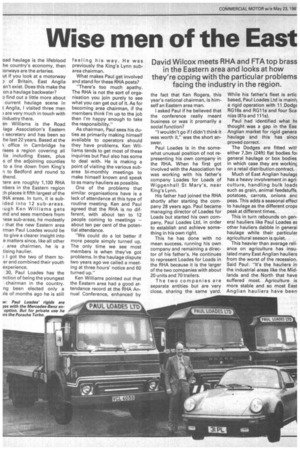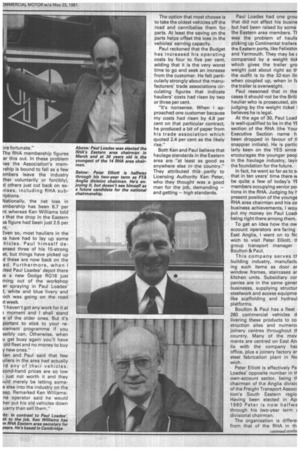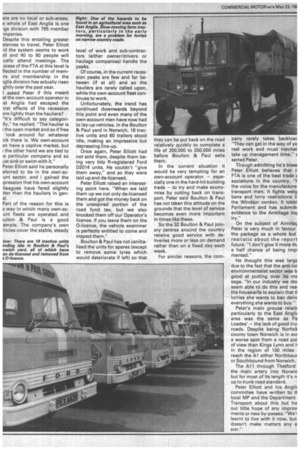Wise men of the East
Page 40

Page 41

Page 42

If you've noticed an error in this article please click here to report it so we can fix it.
oad haulage is the lifeblood he country's economy, then torways are the arteries.
ut if you look at a motorway of Britain, East Anglia sn't exist. Does this make the on a haulage backwater?
D find out a little more about current haulage scene in t Anglia, I visited three men ) are very much in touch with industry there.
an Williams is the Road lage Association's Eastern secretary and has been so he last 22 years. Based at the 1 office in Cambridge he rsees a region covering all lia including Essex, plus s of the adjoining counties to a line down from King's to Bedford and round to the nd.
'tere are roughly 1,100 RHA nbers in the Eastern region h places it fifth largest of the tHA areas. In turn, it is subided into 12 sub-areas. 'ugh Ken Williams gets Ind and sees members from lese sub-areas, he modestly ; that the new Eastern area rman Paul Loades would be to give a clearer insight into e matters since, like all other . area chairmen, he is a tising haulier.
) I got the two of them toer and combined their youth experience.
30, Paul Loades has the nction of being the youngest chairman in the country. ng been elected only a )le of months ago he is still feeling hisway. He was previously the King's Lynn subarea chairman.
What makes Paul get involved and stand for these RHA posts?
"There's too much apathy. The RHA is not the sort of organisation you join purely to see what you can get out of it. As for becoming area chairman, if the members think I'm up to the job then I'm happy enough to take the responsibility."
As chairman, Paul sees his duties as primarily making himself available to operators should they have problems. Ken Williams tends to get most of these inquiries but Paul also has some to deal with. He is making a point of visiting the various subarea bi-monthly meetings to make himself known and speak to as many hauliers as possible.
One of the problems that similar organisations have is a lack of attendance at this type of routine meeting. Ken and Paul agreed that the RHA is no different, with about ten to 12 people coming to meetings — about ten per cent of the potential attendance.
"We could do a lot better if more people simply turned up. The only time we see most members is when they've got problems. In the haulage dispute two years ago we called a meeting at three hours' notice and 60 turned up."
Ken Williams pointed out that the Eastern area had a good attendance record at the RHA Annual Conference, enhanced by the fact that Ken Rogers, this year's national chairman, is himself an Eastern area man.
I asked Paul if he believed that the conference really meant business or was it promarily a social function?
"I wouldn't go if I didn't think it was worth it," was the short answer.
Paul Loades is in the somewhat unusual position of not representing his own company in the RHA. When he first got involved with the Association he was working with his father's company Loades for Loads of Wiggenhall St Mary's, near King's Lynn.
His father had joined the RHA shortly after starting the company 28 years ago. Paul became managing director of Loades for Loads but started his own company, Paul Loades Ltd, in order to establish and achieve something in his own right.
This he has done with no mean success, running his own company and remaining a director of his father's. He continues to represent Loades for Loads in the RHA because it is the larger of the two companies with about 20 units and 70 trailers.
The two companies are separate entities but are very close, sharing the same yard. While his father's fleet is artic based, Paul Loades Ltd is mainl) a rigid operation with 11 Dodgf RG16s and RG11s and four Sca nias (81s and 111s).
Paul had identified what h€ thought was a gap in the Eas Anglian market for rigid genera haulage and this has sincE proved correct.
The Dodges are fitted with either 7.3m (24ft) flat bodies foi general haulage or box bodies in which case they are workinc on a retail distribution contract.
Much of East Anglian haulag€ has a heavy involvement in agri, culture, handling bulk loads such as grain, animal feedstuffs, potatoes, carrots, onions anc peas. This adds a seasonal effect to haulage as the different crops peak at different times.
This in turn rebounds on general hauliers like Paul Loades as other hauliers dabble in general haulage while their particular agricultural season is quiet.
This heavier than average reliance on agriculture has insulated many East Anglian hauliers from the worst of the recession. Said Paul: "It's the hauliers in the industrial areas like the Midlands and the North that have suffered most. Agriculture is more stable and so most East Anglian hauliers have been
Dre fortunate."
The RHA membership figures ar this out. In these problem les the Association's memrship is bound to fall as a few ambers leave the industry ther voluntarily or forcibly), d others just cut back on exnses, including RHA subriptions.
Nationally, the net loss in ambership has been 6.7 per nt whereas Ken Williams told 3 that the drop in the Eastern 3a figure had been just 2.5 per nt.
even so, most hauliers in the aa have had to lay up some hides. Paul himself cleansed three of his 15-strong et, but things have picked up d these are now back on the ad. Furthermore, when I ;ited Paul Loades' depot there is a new Dodge RG16 just ming out of the workshop or spraying in Paul Loades' i, white and blue livery and rich was going on the road ]t week.
'I haven't got any work for it at a moment and I shall stand e of the older ones. But it's portant to stick to your recement programme programme if you ssibly can. Otherwise, when u get busy again you'll have old fleet and no money to buy y new ones."
(en and Paul said that few uliers in the area had actually Id any of their vehicles. cond-hand prices are so low ; just not worth it and they ruld merely be letting some e else into the industry on the aap. Remarked Ken Williams: ne operator said he would her put his old vehicles down uarry than sell them." The option that most choose is to take the oldest vehicles off the road and cannibalise them for parts. At least the saving on the parts helps offset the loss in the vehicles' earning capacity.
Paul reckoned that the Budget has increased his operating costs by four to five per cent, adding that it is the very worst time to go and seek an increase from the customer. He felt particularly strongly about the manufacturers' trade associations circulating figures that indicate hauliers' costs had risen by two or three per cent.
"It's nonsense. When I approached one customer because my costs had risen by 4.8 per cent on that particular contract, he produced a bit of paper from his trade association which quoted 2.4 per cent as the likely rise."
Both Ken and Paul believe that haulage standards in the Eastern area are "at least as good as anywhere else in the country." They attributed this partly to Licensing Authority Ken Peter, who they thought was a good man for the job, demanding — and getting — high standards. Paul Loades had one grou that did not affect his busine but had been raised by some the Eastern area members. was the problem of hauliE picking up Continental trailers the Eastern ports, like Felixsto% and Yarmouth. They may be z companied by a weight tick which gives the trailer gro weight just about right so th the outfit is to the 32-ton lin when coupled up, when in ft the trailer is overweight.
Paul reasoned that in the cases it should not be the Briti. haulier who is prosecuted, sin judging by the weight ticket I believes he is legal.
At the age of 30, Paul Load is well-qualified to be in the YE section of the RHA (the Your Executive Section name h been dropped in favour of tl snappier initials). He is partic larly keen on the YES since encourages the younger peep in the haulage industry, layir the foundation for the future.
In fact, he went so far as to s; that in ten years' time there IA be quite a few of today's YE members occupying senior nor tions in the RHA. Judging by h present position of the younge RHA area chairman and his or.0 business achievements, I wou put my money on Paul Load' being right there among them.
To get an idea how the ow account operators are faring East Anglia, I went on to Nc wich to visit Peter Elliott, tt group transport manager Boulton & Paul.
This company serves th building industry, manufactu ing such items as door ar window frames, staircases ar kitchen units. Subsidiary cor panies are in the same goner businesss, supplying structur steelwork and access equipme like scaffolding and hydraul platforms.
Boulton & Paul has a fleet , 280 commercial vehicles d livering these products to co struction sites and numerot joinery centres throughout th country. Many of the mov ments are centred on East An lia with the company he office, plus a joinery factory ar steel fabrication plant in No wich.
Peter Elliott is effectively Pa Loades' opposite number in tf own-account sector, being th chairman of the Anglia divisic of the Freight Transport Associ tion's South Eastern regio Having been elected in Ap; 1980 Peter is now halfwa through his two-year term divisional chairman.
The organisation is differe; from that of the RHA in th
ere are no local or sub-areas; e whole of East Anglia is one -ge division with 795 member r-npanies.
Despite this entailing greater stances to travel, Peter Elliott id the system seems to work 311 and 40 to 80 people will ually attend meetings. The ccess of the FTA at this level is flected in the number of mem!rs and membership in the Iglia division has actually risen ghtly over the past year.
I asked Peter if this meant at the own-account operator in iSt Anglia had escaped the arst effects of the recession ore lightly than the hauliers? "It's difficult to say categorilly," he replied. "The haulier is the open market and so if free look around for whatever )rk there is. We own-account an have a captive market, but the other hand we are tied to le particular company and so ust sink or swim with it."
Peter Elliott said he personally eferred to be in the own-acunt sector, and I gained the ipression that his own-account !leagues have fared slightly tter than the hauliers in gen al.
Part of the reason for this is a way in which many own-acunt fleets are operated and ulton & Paul is a good ample. The company's own hides cover the stable, steady level of work and sub-contractors (either owner/drivers or haulage companies) handle the peaks.
Of course, in the current recession peaks are few and far between (if at all) and so the hauliers are rarely called upon, while the own-account fleet continues to work.
Unfortunately, the trend has continued downwards beyond this point and even many of the own-account men have now had to lay-up vehicles. In the Boulton & Paul yard in Norwich, 18 tractive units and 60 trailers stood idle, making an impressive but depressing line-up.
Once again, Peter Elliott had not sold them, despite them being very tidy R-registered Ford D2014 units. He couldn't "give them away," and so they were laid up and de-licensed.
Peter Elliott raised an interesting point here, "When we laid them up we not only de-licensed them and got the money back on the unexpired portion of the road fund tax, but we also knocked them off our Operator's licence. If you leave them on the 0-licence, the vehicle examiner is perfectly entitled to come and inspect them."
Boulton & Paul has not canibalised the units for spares (except to remove some tyres which would deteriorate if left) so that they can be put back on the road relatively quickly to complete a life of 200,000 to 250,000 miles before Boulton 8t Paul sells them.
In the current situation it would be very tempting for an own-account operator — especially one in the hard-hit building trade — to try and make economies by cutting back on transport. Peter said Boulton & Paul has not taken this attitude on the grounds that the level of service becomes even more important in times like these.
So the 32 Boulton & Paul joinery centres around the country receive good service with deliveries more or less on demand rather than on a fixed day each week.
For similar reasons, the corn
pany rarely takes backloac "They can get in the way of yo real work and must inevitat take up management time," E sorted Peter.
Though admitting he's biase Peter Elliott believes that t FTA is one of the best trade E sociations in the country. "I the voice for the manufacture transport men. It fights weig bans and lorry restrictions Ii the Windsor cordon. It lobbi Parliament and has submitt, evidence to the Armitage Ing iry."
On the subject of Armitag_ Peter is very much in favour the package as a whole but realistic about the report future. "I don't give it more thi a half chance of being impl mented."
He thought this was largE due to the fact that the anti-lor environmentalist sector was tc good at putting over its mE sage. "In our industry we dot seem able to do this and real the housewife to explain that tl lorries she wants to ban day everything she wants to buy."
Peter's main grouse relatir particularly to the East Anglk area was the same as Pa Loades' — the lack of good trui roads. Despite being Norfoll, county town Norwich is in evt a worse spot from a road poi of view than Kings Lynn and ii in the region of 100 miles reach the Al either Northbour or Southbound from Norwich.
The All through Thetford the main artery into Norwic but for most of its length it's n up to trunk road standard.
Peter Elliott and his Anglii. committee have written to ti local MP and the Department Transport about this but ho out little hope of any improv ments or new by-passes. 'We'N learnt to live with it now, but doesn't make matters any e sier."




































































































